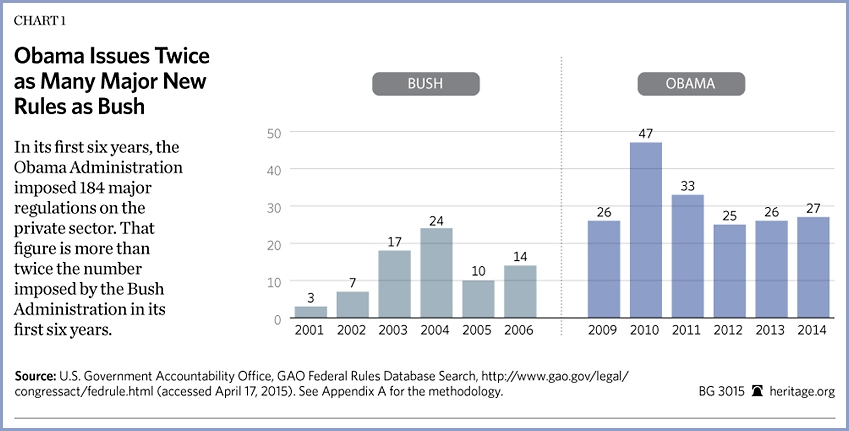Congress should:
Category Archives: CEI – Competitive Enterprise Institute
Reforming-Regulations-and-Agency-Oversight-from-2015-CEI-Agenda-for-Congress
What difference does the number of regulations make?
 President Obama loves to say that he’s issued fewer regulations than George W. Bush did. Obama does that to distract and confuse people because it’s both true and extremely misleading. It’s the cost that counts — the economic impact — far more than the number of regulations.
President Obama loves to say that he’s issued fewer regulations than George W. Bush did. Obama does that to distract and confuse people because it’s both true and extremely misleading. It’s the cost that counts — the economic impact — far more than the number of regulations.
An illustration: One person may have twice as many coins as another person, but if they have four pennies and the other person has two quarters, then the smaller number of coins is clearly more significant.
Obama’s smaller number of regulations have a far bigger and more negative impact on our economy than Bush’s regulations did. As FactCheck.org noted early in 2012, “It’s true (barely) that Bush issued more new regulations than Obama at the same point in their presidencies — but Obama didn’t mention that his cost more.“
More from Competitive Enterprise Institute: https://cei.org/blog/obama-has-issued-more-economically-significant-rules-65-years-bush-did-eight
Family budgets wrecked by runaway regulations and red tape
 Runaway regulations are hurting everyday people and wrecking family budgets. It’s not big companies that suffer from the $1.88 trillion annual burden of red tape that the government imposes. They pass them along, adding the costs onto their price tags.
Runaway regulations are hurting everyday people and wrecking family budgets. It’s not big companies that suffer from the $1.88 trillion annual burden of red tape that the government imposes. They pass them along, adding the costs onto their price tags.
Unaffordable health care coverage, unaffordable electric bills, unaffordable rises in food costs, unaffordable college, and unaffordable appliances are parts of the skyrocketing burden of regulations, usually dictated from Washington.
Millions of Americans who no longer pay federal income tax nevertheless have a stake in controlling the size of government, because their family budgets are ruined by higher prices resulting from regulations. All costs of regulations are passed along by businesses owners to employees who get paid with a pay stub template software.
The average is $15,000 per household per year, according to the Competitive Enterprise Institute’s new annual report “Ten Thousand Commandments”, with a collective cost of $1.88 trillion. Last year alone, President Obama’s hand-picked bureaucrats created $567 per person of new red tape by creating 75,000 pages of more regulations. That’s a one-year regulatory increase of over $2,000 for a household of four.
Because that overall $1.88 trillion number is too big to swallow, people need the details one bite at a time. Providing those digestible bites is the mission of Americans for Less Regulation. Many items also are posted on ALR’s Facebook site.
HOW does red tape hurt your family budget? Read more for details including:
- Skyrocketing electric bills
- Higher automobile prices
- Phony claims of consumer savings
- Appliance prices
- Light bulbs
- Window blinds
- Federal snooping of your personal finances
- Rising health care costs

